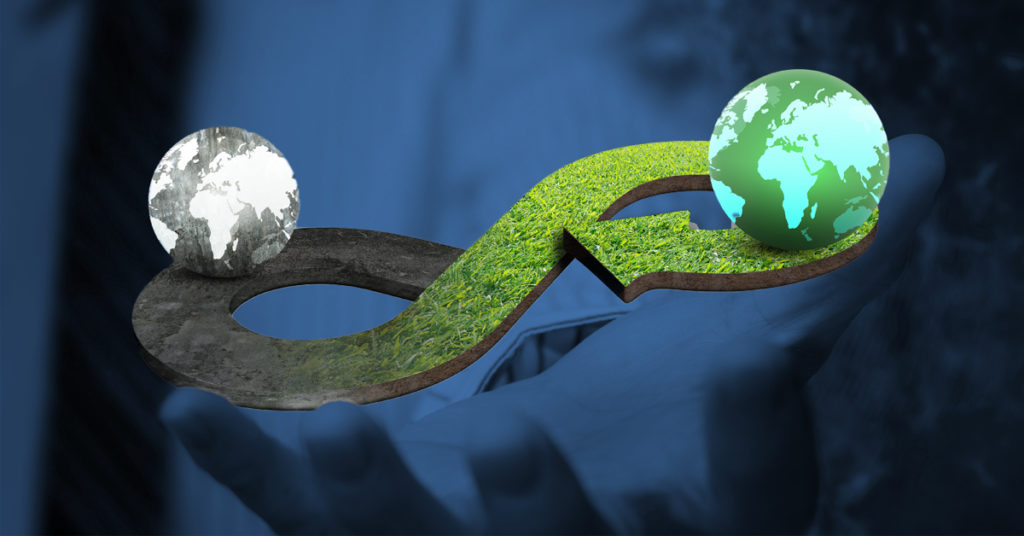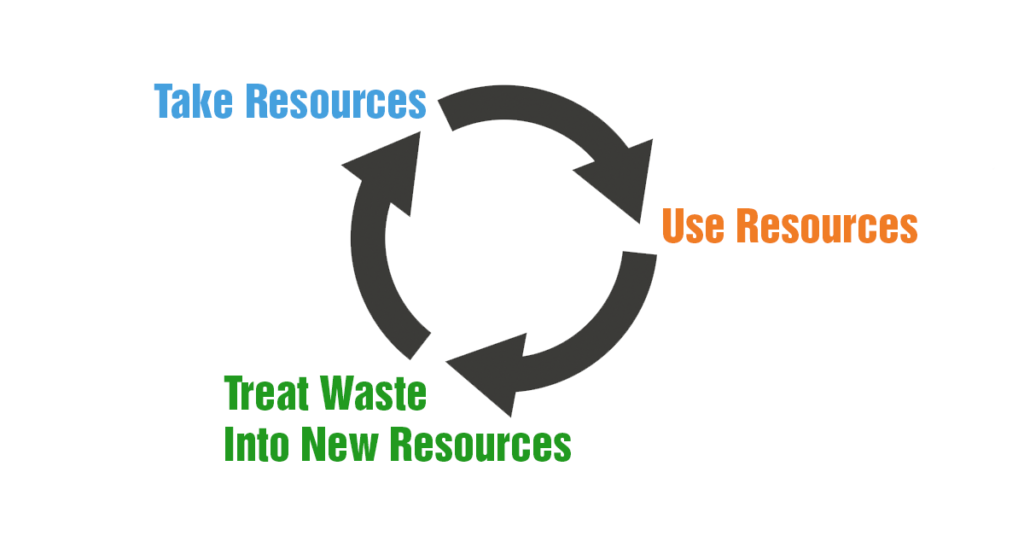
We live in a world of finite resources. The plain truth is that the earth’s raw materials are just not limitless.
Much of what we use in the world today comes and goes in an economy that could be described as linear:
FIND RESOURCES > MAKE THINGS > DISPOSE OF THE WASTE > HOPE THE EARTH RECLAIMS IT
Resource Examples include: Water, Plants, Trees, Minerals, and Air.
This Linear Method of using the earth’s resources is proving difficult to sustain.
Does it go on and on until we have no more resources to even start the first step?
Or do resources become so rare or overly regulated that it gets too expensive to produce our products or services?
Obviously, there is a balance to maintain.
Resources we use for any job, task, or operation can be better looked after if they can be reduced, recycled or reused.
Humans, and the science we’ve developed, have the ability to help the earth conserve and reclaim resources through management, recycling and reuse opportunities. Even small steps can add up and make a difference to our communities and our environment.
How do we do that?
Let’s consider the idea of a “circular economy” in our operations.
A “circular economy” is an economic system aimed at reducing waste and minimizing the continual use of resources through conservation, reclaim, repurpose, and reuse, especially if it can be done in the shortest loop possible.
This happens in many ways on our earth right now, and the possibilities for even more are around every corner.
As you can imagine, this is a popular concept related to isolated areas, like a pacific island where resources are very limited.
But not all islands are surrounded by water.
A Circular Economy on a Remote Worksite
At remote or temporary camps where workers live and work, resources such as utility infrastructure, water, labor, and power are limited.
If there is no water utility, how do you process your waste?
In a circular economy, sewage should be collected and processed on-site with a micro utility provider instead of being hauled off.
Processing the sewage on-site provides a reuse stream for the industrial operation, whether that is water for drilling operations, dust suppression on a construction location, or even irrigation.
Such reuse eliminates the need to haul out waste with trucks.
By not reusing the water onsite, other water resources have to be hauled in, while the waste is being hauled out, unnecessarily breaking the cycle of a circular economy and substituting it for a linear one.
Additionally, the trucking creates unnecessary carbon emissions and traffic that negatively impacts our air, roads, and citizens, costing money, lives and depleting too much of our finite resources.
Let’s reframe the operation structure:

If you are looking to establish this type of circular economy operation for your worksite, we have a solution for you—WaterFleet’s mobile utility operations.
WaterFleet’s Contribution to The Circular Economy
WaterFleet is committed to utilizing processes and procedures to eliminate waste and contribute to the continual use of resources.
The first step is WaterFleet’s Water Rig.
The Water Rig is a self-contained water processing system, capable of taking brackish water, and any kind of contamination from that water, and treating it to verifiable potable water standards that can be distributed throughout a camp for human use.
For The second step, WaterFleet takes that wastewater and runs it through the Reclaimer Rig, a self-contained proprietary service that can process sewage to a reuse standard.
With the Reclaimer Rig, WaterFleet brings everything necessary to process sewage at a remote location and provide a reuse stream from that treated wastewater, which is then delivered to the operation for use in the operation.
In short, the non-potable water at the site is converted to human use water, then the human waste resulting from that is converted into industrial use water which gets applied where it would have been used in the first place…
A double recycle opportunity inside a circular economy.
The days of hauling waste in and out of your worksite and putting dozens of extra trucks on our roads are gone.
WaterFleet deploys the services to safely:
- Treat the water
- Distribute the product
- Recover the waste
- Treat the waste back to reusable water
- Provide it to the operation
All while maintaining, testing, and reporting on the operation.
The Circular Economy in Pecos, Texas
WaterFleet supplied both water and wastewater services to a man camp of about 25 workers living in portable housing for weeks at a time in Pecos, Texas, a remote area located in far West Texas near the border of New Mexico.
This is an example of an “island” that is not surrounded by water!
The climate was unpredictable, and the infrastructure was sparse.
However, WaterFleet was able to secure a water source near the main camp, filter the water to make it potable water for the workers, collect their sewage, process it, and give it back to their drilling operation for their downhole and other industrial activities.
The operation successfully produced enough potable water to eliminate the need for bottled water and reduced their need for additional water haul-ins for downhole needs.
This process saved tens of thousands of gallons of water from being pulled from the environment, provided a higher level of safety and wellness for those living on-site, reduced plastic bottle trash and other waste, provided a better quality of life for those living on or near the site, and reduced the client’s carbon emissions by eliminating a significant number of truck miles off of the roads.
It also saved the client company about $6,300 per month!
This circular economy solution is a win-win for all involved.
Conclusion
We are all in this together as we operate on finite resources.
Sustaining progress and growth for our businesses is on all of our minds going into 2021, and introducing circular economies into our operations will strengthen the path of health and well being of our populations, businesses, work force, and the environment.
It is a great contributor to the environmental, social, and governance objectives so many of us have.
Circular economies are important, whether you live on a remote pacific island, or a camp in West Texas!
Want to learn about how you can adopt a circular economy on your worksite? Contact WaterFleet to discover all your options in the oil & gas, construction, emergency services, and interim utility support industries.
